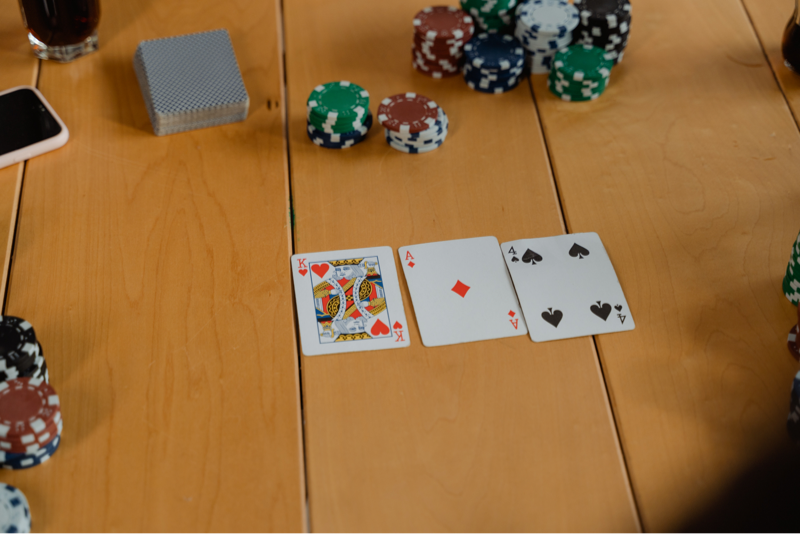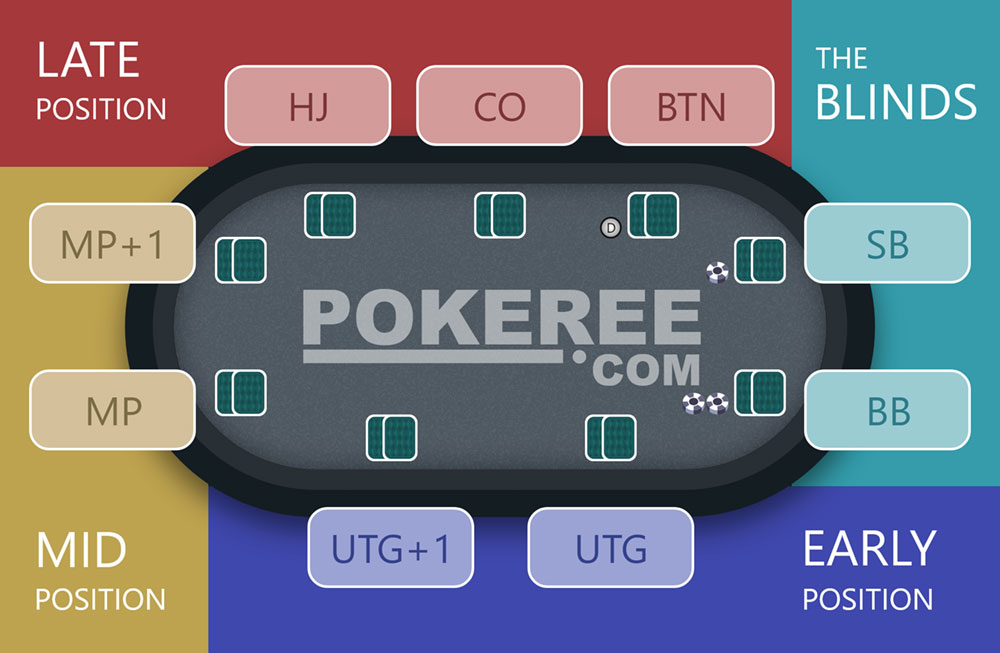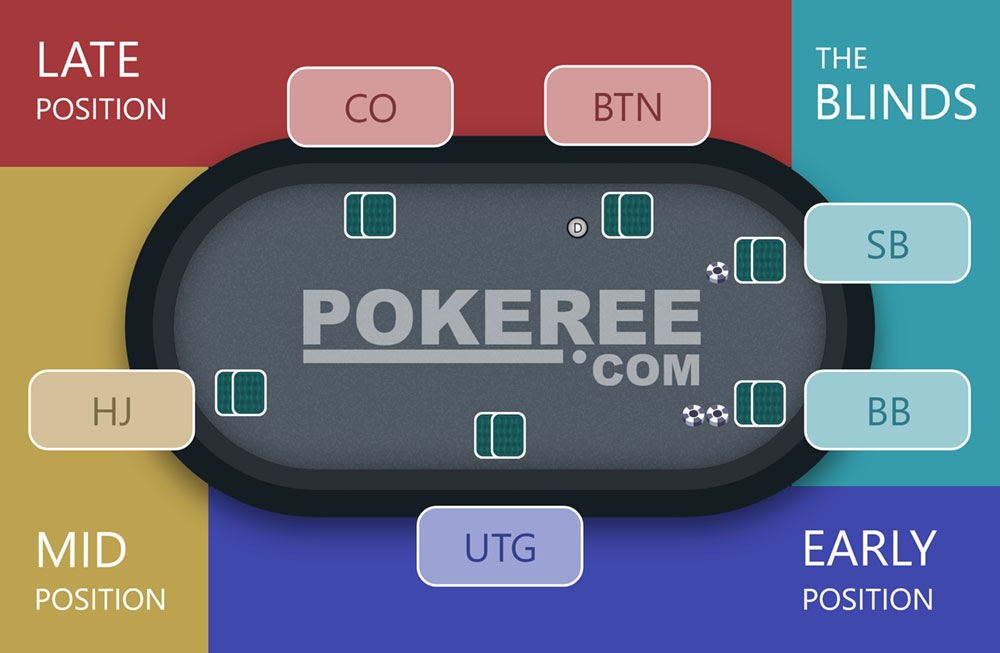
Position in poker refers to the order in which players are seated around the table and the related poker strategy implications. Players who act first are in “early position”; players who act later are in “late position”; players who act in between are in “middle position”; players who post the small blind or big blind are in “the blinds”.
A player who acts first is “out of position” while a player who acts last is “in position”. Playing in position gives a distinct advantage due to the extra information gained and the ability to more effectively control the size of the pot.
Positions in Poker
The seats around a poker table are usually described as being:
- Early position
- Middle position
- Late position
- The blinds
Position Names
For a full-ring (9 players), which is the most common casino format:
- Under the Gun (UTG)
- UTG+1
- Middle Position (MP)
- Middle Position +1 (MP+1), also known as Lojack (LJ)
- Hijack (HJ)
- Cutoff (CO)
- Button (BTN)
- Small Blind (SB)
- Big Blind (BB)

For a 6-max (6 players), you have:
- Under the Gun (UTG)
- Hijack (HJ)
- Cutoff (CO)
- Button (BTN)
- Small Blind (SB)
- Big Blind (BB)

Early Position
The first seat to act is referred to as under the gun and is located in early position. “Under the gun” is a term that means to be “under pressure to act” as in you are “being held at gunpoint”.
This translates to the analogy of the first seat at the poker table who is under pressure to make the opening decision of the freshly dealt hand.
On a full ring table with nine players in total, there are eight players waiting to act after UTG. So there is a strong likelihood that if you decide to play your hand, another player at the table will wake up with a premium hand.
Even if someone is dealt a mediocre hand and decides to play, you will be playing out of position on postflop unless they happen to be in the blinds.
When there are many players still to act preflop, you need a very strong hand to even consider entering the pot.
Middle Position
The next position category is middle position. From here you should still be playing fairly conservatively, however, you can open a few more combos of hands when compared to UTG since two players have already folded meaning it is less likely:
- That you will come up against a strong hand
- That you will be forced to play out of position postflop
Late Position
Following MP is late position which represents the three seats of hijack, cutoff and button.
Hijack will play more hands than MP but it’s not until the cutoff and the button where we really start to open our range up.
Due to the fact that you will always act last on the button when playing postflop, it is considered the best and is almost always the most profitable seat on a poker table.
The Blinds
The blinds are a slightly different. Firstly, players in the blind have to put in a small “fee” before seeing their cards i.e. there are putting in money blind into the pot, hence the name.
Secondly, when playing from the blinds, you will mostly be reacting to other player’s raises as opposed to make them yourself. This forces you to use a different strategy than we have been using up until now – you must now start calling much more often, particularly from the big blind.
The Small Blind is the worst seat (as you will always act out of position and act with the least amount of information) and the Big Blind is the least profitable seat on the table as you have to put a whole big blind into the pot without even seeing your cards.
The two redeeming qualities of the big blind are that we already have 1 bb invested into the pot which means despite our positional disadvantage versus all seats except the SB, we will usually have the opportunity to “close the action” by calling and seeing the flop.
Closing the action means that we are guaranteed to realise some of our equity (potentially allowing us to hit a piece of the flop). The same can’t be said for the SB where if we call a raise, the Big Blind has the opportunity to reraise us with a squeeze and put us in a tough spot.
The Importance of Position
The best no-limit hold'em players generally choose to play most of their hands from late position, fewer from middle position, and least from early position.
Not coincidentally, they also win most of their money playing from later position, with even the best hold'em players tending to be net losers when playing from early position.
Here's a quick list of five reasons why positioning in poker is so important and playing in position is preferable in no-limit hold'em:
1. More free cards
There are times when playing drawing hands when you'd rather not pay the price to get to the next postflop street.
When you have position on your opponent, you have the opportunity to take a "free card" if your opponent checks to you while you are on a draw, checking behind to see the next community card.
2. Pot control
Acting last on every postflop street usually helps you control how big or small of a pot you end up playing.
If you wish to play a small pot and an opponent checks, you can check behind, and if your opponent bets you can just call and close the action.
If you want to play a bigger pot, you can bet or raise when the action is on you.
When out of position, you can't check and be sure your opponent will check and let you see the next card for free. Nor can you bet and be sure your opponent will fold or only call you (thus keeping the pot small).
3. More bluffing opportunities
Having position on an opponent is so valuable, it can often make up for having a relatively weak hand.
In other words, your literal hand strength may be weak, but by getting to act last you have a lot more leverage when trying to represent stronger poker hands.
4. Calculating pot odds
Say you are in a four-way hand holding {k-Clubs}{10-Clubs}, the flop comes {q-Diamonds}{j-Diamonds}{5-Clubs}, and you are second to act.
There is 1,500 in the middle and the first player leads with a bet of 500. With your open-ended straight draw you'd like to call and see the turn.
If you were last to act, you'd know for certain what your immediate pot odds were — you're trying to win 2,000 and need only call 500, so your pot odds are 4-to-1.
With players still to act behind you, you can't make this calculation.
You don't know if the other two players will just call also (making your pot odds even better), or if one might raise and force you to pay even more to stick around (making your pot odds potentially much worse).
If you were in position and acting last, though, you could know precisely what your pot odds were going forward.
5. Knowing your opponent's action
This is the biggest advantage to having poker position (and frankly covers all of the advantages listed above) — namely, being able to know how your opponent is going to play a given postflop street before you have to make your decision how to play it.
You are more informed knowing that while your opponent can always be trying to deceive you, a check usually means they are not so enthused by the board while a bet indicates interest.
When playing from position, a lot of strong players use an opponent's action as a primary factor when deciding how to play each street.





